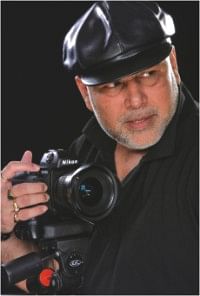“Photography is silent music” -- Chanchal Mahmood

Chanchal Mahmood
His first ever box of paint is kept neatly on his right. Some old brushes to his left. The soft sound of music pervades the room. Everything in Chanchal Mahmood's office reflects what he is and what he wants from life. "I live every moment," says the eminent photographer. A photo-shoot just near the corner, his assistant's jamming the keys at work. A flag, given to him by Bangabandhu at one side. At one corner it's written, "Photography is silent music" (his quote). A flag of the Brazilian football team at another corner. Volumes of encyclopaedias and research works just on his desk. And many other souvenirs that lock the memories of the past, also near him, just in his cosy office.
For one thing, looking at the diverse arrangement of thing -- CDs, books, paintings and photography -- one can expect this photographer to have diverse interests. Interestingly, that is the case. He does not work to live, but loves to work. While it is a common phenomenon that people study to get a degree so that they can get a lucrative job and status, some, in fact, very few break out of this chain of thought. Chanchal Mahmood is one of them. To him, job satisfaction is everything. "Money is important, but it is not the only thing that can keep you happy. Sometimes it can just make you a slave, even by giving you what you want. I love myself and my work. I am truly happy for this reason and most importantly I love my country," he asserts.
When there was a trend for the sons of prominent personalities to become either doctors or engineers, the late Basiruddin Ahmed, refuted the norms, wanting to become a painter instead. Painting! Nobody had even thought of this as a profession. And despite his requests and attempts to get admitted to the Art College, he found himself stuck studying political science. However, his son Chanchal was to pursue his dreams. Like his favourite personalities, Che Guevara and Fidel Castro, he was also to revolutionise the traditional concepts of photography in Bangladesh.
"Hobby became passion, passion became profession (Shokh hoechhe nesha, nesha hoeche pesha)," he says.
It was 1974 when he first took up painting as his hobby. From an early age, Chanchal was moved by the sufferings of poor and underprivileged people, and always aspired to help them. He sought to help them with his craft -- formerly painting, but formidably photography at present. Unfortunately, the clash of interests resulted in the son drifting away from his father, eventually being torn apart. At the peak of his success, his father died last year in August. He was never able to see what had become of his rebellious son. It was curiously his father who had handed him his first camera, something that he has stored as a treasure and cherishes it.
Chanchal had understood the value of striving to struggle, and its outcome in time. "Although the scene has changed, yet it is quite tough to be a professional photographer here because of the lack of initiatives, materials, education and degrees," he says. He still loves black and white photography, which he adds with dismay, is eroding.
"I didn't become a painter but I now paint with light.'' It was the famous cartoonist Rafiqun Nabi, and some more well wishers like actor Afzal and artist Hashem Khan who encouraged him towards photography.
Chanchal says that he loves teaching and that he loves his students. "There are college students, housewives, university professors, professionals, teenagers, et al. The unity is rather interesting, but the bond all the more, as these people are united through their passion for photography. Photography has so much power, it can change the world," he says.
Everyone has a commitment, he believes, towards the disadvantaged and with that view in mind, Chanchal donates to a free school for street kids and he also takes care of 17 orphans. "How can we forget our duties towards the Freedom Fighters?" he questions. The photographer has arranged for the livelihood of four such distressed heroes.
Chanchal Mahmood has travelled to several countries, and has won over 150 national and international prizes.
"Everybody sees, but an artist sees more. I have a third eye as a photographer, that seeks out the life in colours and feelings in objects." He believes that music is connected to photography. "Photography is the eye of the heart," he concludes.
He has his 18th exhibition titled “Hridoye Bangladesh” coming up on March 19 at Bengal Gallery.
The writer is a freelance contributor.

 For all latest news, follow The Daily Star's Google News channel.
For all latest news, follow The Daily Star's Google News channel. 



Comments